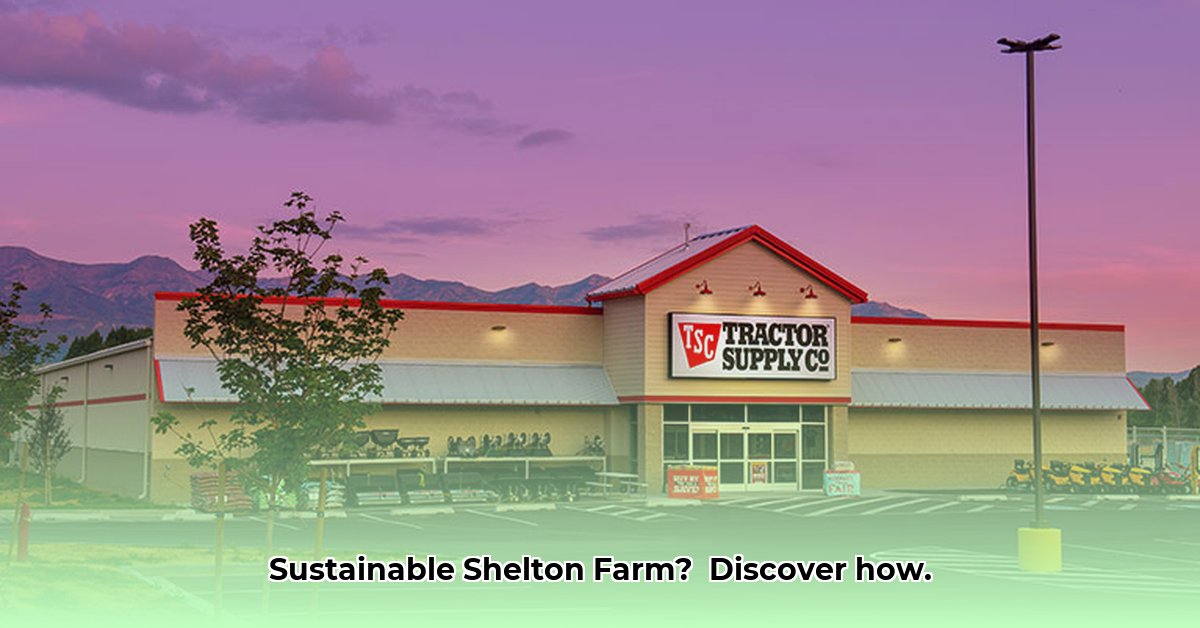
Tractor Supply Company: Partnering with Shelton Farmers for a Sustainable Future?
Tractor Supply Company (TSC) is a ubiquitous presence for farmers and gardeners across the nation, including Shelton, Washington. This case study examines TSC's role in furthering sustainable agricultural practices within the Shelton community, analyzing its product offerings, highlighting successes and shortcomings, and proposing actionable steps toward a greener future. Does TSC truly support sustainable farming, or does its contribution fall short of expectations? This investigation aims to answer precisely that. For more information on sustainable greenhouse options, check out these greenhouse kits.
TSC's Current Contribution to Sustainable Agriculture in Shelton
TSC offers a vast inventory encompassing both conventional and sustainable agricultural products. Items like drip irrigation systems and organic seeds demonstrably support eco-conscious farming. However, a significant drawback is the inconsistent and often unclear labeling regarding sustainable sourcing practices. This lack of transparency hinders informed purchasing decisions by farmers seeking environmentally friendly options. One could easily overlook a truly sustainable product amidst many that are not, simply due to poor labeling or organization. How much water, ultimately, can be conserved if the farmer can't easily identify water-saving irrigation systems?
Real-World Impacts: Successes and Shortcomings in Shelton and Beyond
Anecdotal evidence suggests a mixed impact of TSC on sustainable agriculture. Some Shelton farmers successfully employ TSC-sourced organic fertilizers to improve soil health, reducing reliance on harmful chemicals and lowering environmental burdens. These farmers directly benefit from TSC's availability of such products. Yet, others unintentionally hinder sustainable practices. The absence of readily apparent sustainable labels can lead farmers to unintentionally choose products with a high environmental impact resulting in missed opportunities to integrate more sustainable practices. This highlights a critical need for TSC to improve product information and labeling to empower sound environmental choices by farmers.
Opportunities for Enhanced Sustainability at TSC
TSC has the potential to become a leader in sustainable agriculture. These actionable recommendations aim to capitalize on that potential:
Dedicated Sustainable Farming Section: Implement a clearly designated section within all stores dedicated to sustainable agricultural products. This would significantly improve customer navigation and purchasing of eco-friendly supplies. The efficacy of this change could be measured by tracking an increase in sales of products within this section.
Comprehensive Educational Programs: Partner with local agricultural extension offices and experts to conduct workshops and webinars on best sustainable farming practices. Success would be measured by increased farmer participation in these educational initiatives and, subsequently, demonstrable adoption of sustainable techniques.
Enhanced Transparency in Labeling and Sourcing: Mandate clear and consistent labeling on all products, highlighting sustainable certifications (USDA Organic, etc.), sourcing information, and environmental advantages. Success here could be evaluated through customer surveys gauging their understanding of product sustainability attributes.
Strategic Community Partnerships: Collaborate with community gardens, farmers' markets, and other local organizations to promote sustainable practices and TSC's role in facilitating them. This would build brand trust and improve community engagement. This success could be measured by the increased participation of farmer communities in such partnerships.
Addressing Challenges and Mitigating Risks
The transition to greater sustainability does present challenges:
Higher Costs: Sustainably produced goods often command higher prices. TSC can mitigate this by emphasizing long-term economic benefits (like healthier soil, reduced chemical costs) and exploring cost-effective options.
Sourcing Challenges: TSC needs to develop stronger relationships with certified sustainable suppliers to ensure a reliable supply of high-quality products.
Consumer Education: A broader public awareness campaign to inform consumers about the environmental benefits of sustainable products is crucial.
Negative Brand Perception: Transparency and proactive communication of sustainability progress are vital to prevent potential brand damage.
Conclusion: A Shared Harvest for a Sustainable Future
TSC’s role in Shelton’s agricultural sustainability is complex, showing both promise and shortcomings. By prioritizing clear labeling, enhanced consumer education, strategic partnerships and transparent supply chains, TSC can significantly bolster its contribution to sustainable practices. This collaboration between TSC, farmers, and consumers is vital to fostering a more environmentally responsible and economically resilient agricultural sector. The future of Shelton's farming, and indeed much of agriculture, depends on such shared efforts.